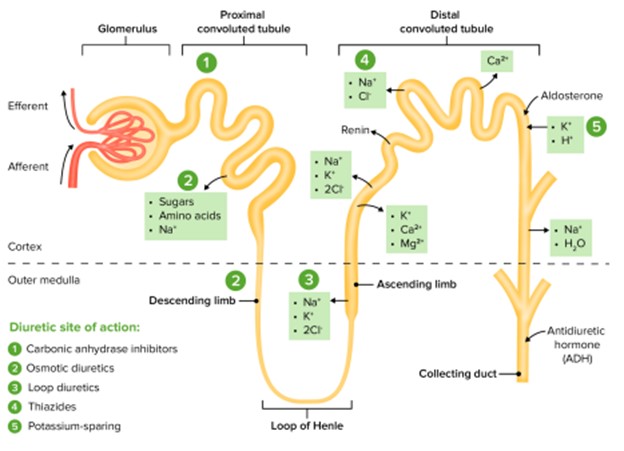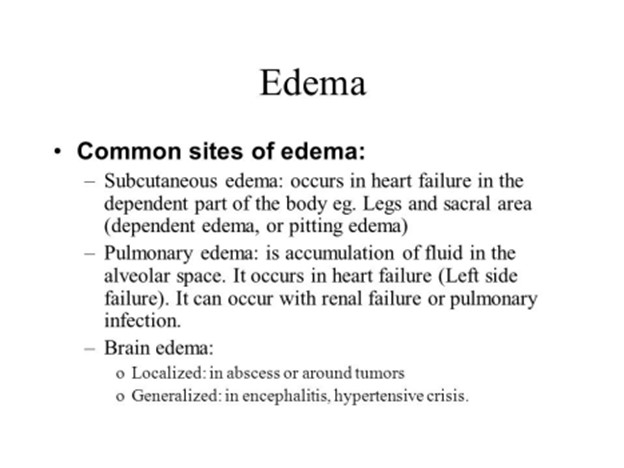You're providing discharge instructions to a patient who will be taking a loop diuretic at home. Which statement by the patient demonstrates they did NOT understand the teaching material and requires that you reinforce some of the teaching points?
"I will weigh myself daily and report to my physician if I gain more than 3 lbs in 1 day."
"This medication can cause dehydration, so I will stay hydrated by consuming at least 2 L or more of fluid per day."
"I will eat a diet rich in potatoes, bananas, avocadoes, strawberries, and spinach."
"I will change position slowly because I can become dizzy easily while taking this medication."
The Correct Answer is C
Loop diuretics, such as furosemide, are known to promote diuresis (increased urine output) and can cause electrolyte imbalances, including low potassium (hypokalemia). The patient's statement about eating a diet rich in potassium-containing foods like potatoes, bananas, avocadoes, strawberries, and spinach is incorrect in this context. These foods are indeed good sources of potassium, but when taking loop diuretics, it is necessary to monitor and potentially restrict potassium intake to prevent excessive potassium levels.
"I will weigh myself daily and report to my physician if I gain more than 3 lbs in 1 day." This statement reflects the patient's understanding of the need to monitor their weight daily as a means of assessing fluid balance. Rapid weight gain may indicate fluid retention, which should be reported to the physician.
"This medication can cause dehydration, so I will stay hydrated by consuming at least 2 L or more of fluid per day." This statement demonstrates awareness of the potential for dehydration when taking loop diuretics and the importance of staying adequately hydrated by consuming an appropriate amount of fluids.
"I will change position slowly because I can become dizzy easily while taking this medication." This statement reflects the understanding that loop diuretics can cause orthostatic hypotension,
leading to dizziness upon sudden changes in position. Taking precautions and changing position slowly can help prevent falls and related injuries.

Nursing Test Bank
Naxlex Comprehensive Predictor Exams
Related Questions
Correct Answer is C
Explanation
A low-pressure ventilator alarm indicates a potential issue with the delivery of adequate air or pressure from the ventilator. The pulse oximetry reading of 85% suggests that the client is not receiving sufficient oxygenation.
Providing ventilation with a bag-valve-mask device allows the nurse to manually assist the client's breathing and ensure proper oxygenation and ventilation while troubleshooting the ventilator alarm. By manually ventilating the client, the nurse can help maintain oxygenation and prevent further hypoxemia until the underlying cause of the alarm can be identified and resolved.
Suctioning the client's endotracheal tube, adding air to the pilot balloon, or placing a bit block in the client's mouth may be appropriate interventions in specific situations, but they are not the immediate priority in this case. The primary concern is to address the low oxygen saturation and ensure adequate ventilation.
Correct Answer is E
Explanation
Dependent edema refers to the accumulation of fluid in the dependent parts of the body, which are areas that are most affected by gravity when a person is in a supine or sitting position for an extended period. The sacrum, which is the triangular bone at the base of the spine, is one such dependent area. It is prone to developing edema when there is increased fluid retention in the body, as seen in the patient's weight gain.
To assess for dependent edema accurately, the nurse can gently press the skin over the sacral area with their fingers and observe the skin turgor or the return of the skin to its normal position after releasing the pressure. If there is edema, the skin may have reduced elasticity and take longer to return to its normal position (poor skin turgor).
While edema can occur in other dependent areas such as the feet, ankles, and lower legs, assessing skin turgor in these areas may not provide an accurate determination of dependent edema as they are located further away from the sacrum and may be influenced by other factors.

Whether you are a student looking to ace your exams or a practicing nurse seeking to enhance your expertise , our nursing education contents will empower you with the confidence and competence to make a difference in the lives of patients and become a respected leader in the healthcare field.
Visit Naxlex, invest in your future and unlock endless possibilities with our unparalleled nursing education contents today
Report Wrong Answer on the Current Question
Do you disagree with the answer? If yes, what is your expected answer? Explain.
Kindly be descriptive with the issue you are facing.
